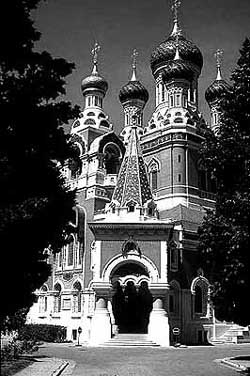|
The Russian Orthodox Church
The fiercest despot in the history of Russia, Ivan the Terrible, pushed back the boundaries of his kingdom, annexing Siberia and taking control of the Volga River.
 Moscow's importance as a center of Orthodox Christianity was enhanced through this expansion. Russian Orthodoxy had become a force to be reckoned with. Moscow's importance as a center of Orthodox Christianity was enhanced through this expansion. Russian Orthodoxy had become a force to be reckoned with.
The Russian Orthodox Church resisted strong attempts to bring it under the control of Rome.
Influence of the State in Church Matters
Peter the Great interfered frequently and increasingly in church matters, making the church little more than a department of state. Church revenues came under state control, and priests became civil servants, often despised by the populace. Peter also reorganized schools and monasteries, bringing them under the control of the state.
In 1721, Peter the Great abolished the traditional Patriarchal system, replacing it with a council of bishops, controlled by a layperson, who was himself under the direction of the Tsar.
The church became so firmly linked to the Romanov family that when the dynasty fell in 1917, the church was taken down with it.
|
